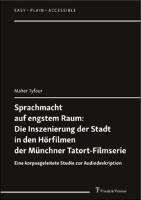Sprachmacht auf engstem Raum
Die Inszenierung der Stadt in den Hörfilmen der Münchner Tatort-Filmserie
Abstract
Audio films enable blind and visually impaired people to enjoy a feature film. An audio film consists of the original audio track of the film and the audio description. This film description compensates for the video track of the film. It is therefore a purely auditory media text. Translation studies consider the work of audio descriptors as an intercodal translation process and as a part of audiovisual translation. Maher Tyfour examined the concrete implementation of audiodescription on a corpus of image translations for the Munich Tatort series. His focus was on the city's staging. By comparing them with the original video tracks of the feature films, he illustrates the intertextual relationship between original and translation. In the analysis he identifies the strategies of the audio descriptors that are partly unconsciously implemented in the translation process, explains them and discusses them in terms of text and translation studies. Maher Tyfour studied English at the University of Damascus (Syria) before coming to Germany in 2009. After completing his master's degree in Intercultural German Studies at the Georg-August University of Göttingen, he earned his doctorate at the University of Hildesheim. He works as a teacher of English and German as a second language in Saxony.
Keywords
Batic; Leitmayr; Munich; audiodescription; blind; audio film; audiomovie; Staging; Visually impaired; Language Power; City; TatortDOI
10.26530/20.500.12657/52364ISBN
9783732991143, 9783732906994, 9783732992799Publisher
Frank & TimmePublisher website
https://www.frank-timme.de/Publication date and place
Berlin, 2021Classification
Linguistics
The Arts
Educational strategies and policy


 Download
Download Web Shop
Web Shop